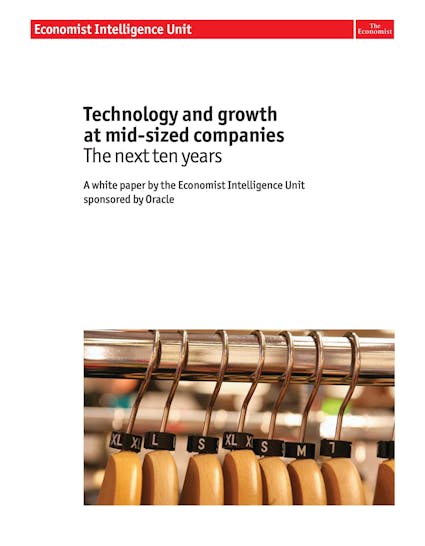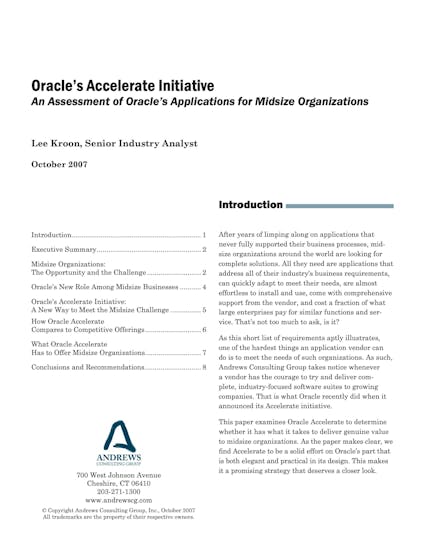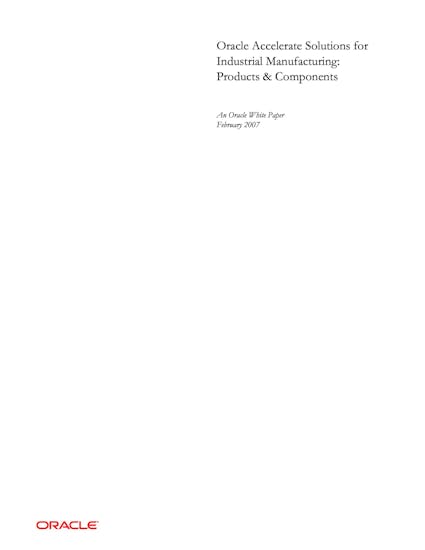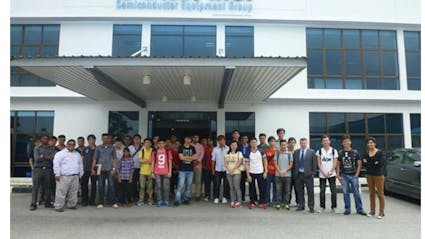Oracle ERP Systems and Solutions Comparison
Compare ERP systems from Oracle, a global technology company founded in 1977 and headquartered in Austin, Texas. Oracle is one of the world’s largest enterprise software vendors and offers a broad portfolio of ERP solutions under its Oracle Fusion Cloud Applications suite, as well as legacy systems like Oracle E-Business Suite, and JD Edwards EnterpriseOne.
Oracle’s ERP software is used by organizations of all sizes across a wide range of industries, including manufacturing, retail, financial services, healthcare, and the public sector. Its flagship Oracle Fusion Cloud ERP provides integrated modules for finance, supply chain, HR, and customer experience, leveraging emerging technologies (AI, machine learning, IoT) to automate processes and enable real-time insights. With its acquisitions and continual innovation, Oracle’s ERP offerings help enterprises around the world streamline complex operations, manage global business requirements, and drive efficiency at scale. Read our selection guide.
3 ERP Systems Found
Price Range$25,000K - $500,000K |
Price Range$15K - $400K |
Price Range$25K - $350K |
Cost Per User$500/mo |
Cost Per User$1,000/mo |
Cost Per UserN/A |
Deployments
Cloud
On-Premise
|
Deployments
Cloud
On-Premise
|
Deployments
Cloud
On-Premise
|
Retention Rate
85%
|
Retention Rate
N/A
|
Retention Rate
N/A
|
Version2023 |
Version9.0 |
VersionRelease 12 |
Financing OptionsSubscription |
Financing OptionsLease, Subscription |
Financing OptionsLease, Finance |
User Range25 — unlimited |
User Range15 — 1000 |
User Range25 — 1000+ |
Minimum Fee to Implement$200,000 |
Minimum Fee to Implement$15,000 |
Minimum Fee to ImplementN/A |
Awards4 |
Awards- |
Awards- |
Installs1000+ |
Installs8,000+ |
Installs20,000+ |
ArchitectureHosted Cloud |
ArchitectureSOA |
ArchitectureSOA |
System SummaryOracle Fusion Cloud ERP is a modern, cloud-based suite offering AI and real-time analytics for manufacturers. It provides automatic updates to streamline processes and improve decision-making. The suite includes modules for financial management, project management, and supply chain management, aiming for faster deployments and lower ownership costs. |
System SummaryJD Edwards EnterpriseOne from Oracle is a comprehensive ERP system that supports business growth with its flexible, scalable architecture and low cost of ownership. It allows customization in databases, operating systems, and hardware, backed by Oracle's strong support infrastructure. |
System SummaryOracle E-Business Suite is an integrated ERP system enhancing enterprise performance management with business intelligence. It streamlines strategic and operational processes to boost management efficiency and ROI, fostering agility and lowering costs. |
Core Features
|
Core Features
|
Core Features
|
Unique Features
|
Unique Features
|
Unique Features
|
Limitations
|
Limitations
|
Limitations
|
|
ERP System Details
|
ERP System Details
|
ERP System Details
|
Oracle ERP Solutions: A Comprehensive Vendor Profile
In this ERP selection guide we cover
- Meet Oracle: ERP Market Pioneer
- Oracle’s ERP Portfolio: A Complete Overview
- Oracle Fusion Cloud ERP
- NetSuite: Cloud ERP for Growing Businesses
- Oracle’s Legacy ERP Systems: Continuing Value
- Partnering with Oracle: Implementation and Support
- Ongoing Support and Maintenance
- Oracle ERP Resource Center
- FAQs

Oracle has established itself as the world’s second-largest software company and a major player in enterprise resource planning. The company serves customers across 175 countries and competes directly with ERP giants like SAP, Microsoft, and Sage.
Oracle offers four leading ERP platforms: Oracle Fusion Cloud ERP, NetSuite, JD Edwards EnterpriseOne, and Oracle E‑Business Suite.
Each system targets different business sizes and operational complexities, from growing manufacturers to global enterprises managing complex international supply chains.
What makes Oracle particularly compelling for manufacturing is its AI-first approach to ERP. The company has embedded artificial intelligence throughout its platform, enabling automated invoice approvals, predictive cash flow forecasting, and real-time management of supply chain disruptions.
This profile examines Oracle’s complete ERP portfolio from a manufacturing perspective, covering key features, ideal business sizes, and the implementation realities that matter most to manufacturing leaders.
Meet Oracle: ERP Market Pioneer
Understanding Oracle’s approach to ERP requires understanding the company itself. Oracle didn’t start as an ERP vendor; it became one through decades of strategic acquisitions and organic growth.
Oracle operates far beyond enterprise resource planning, serving as a comprehensive technology provider with cloud infrastructure, database management, artificial intelligence platforms, and enterprise applications spanning nearly every business function.
Oracle’s Journey: From Database Giant to Cloud Leader
Oracle’s story begins in 1977 when Larry Ellison founded the company, which focused on relational database technology. What started as Software Development Laboratories would eventually become Oracle Corporation, named after their first major project, Oracle, a database system built for the CIA. By the 1980s, Oracle had established itself as the dominant database vendor.
Oracle’s Market Position and Strategy
Oracle provides the entire technology foundation, encompassing databases, cloud infrastructure, artificial intelligence platforms, and enterprise applications.
Oracle’s ERP philosophy centers on “AI-First” enterprise software with machine learning and AI capabilities embedded throughout its platform architecture. This approach stems from Oracle’s unified data model strategy. While competitors often use separate data models for different applications, Oracle has built all ERP modules on a single, integrated data foundation.
Key Differentiators in Oracle ERP Software
- Unified Architecture: A Single data model enables true real-time integration and AI functionality across all business processes.
- Embedded AI: Manufacturing-specific capabilities, including predictive maintenance, automated quality control, and supply chain disruption prediction.
- Technology Ownership: Complete control of the technology stack from database to application layer.
- Simplified Upgrades: Quarterly updates deploy across all modules simultaneously.
For manufacturing companies, this translates to simplified IT management, reduced integration costs, and seamless leverage of emerging technologies, such as IoT and advanced analytics.
Oracle’s ERP Portfolio: A Complete Overview
Oracle operates a unique four-platform ERP strategy spanning the entire business spectrum, from growing manufacturers to global industrial conglomerates. This approach acknowledges that different businesses have distinct ERP requirements.
Oracle’s Current ERP Strategy
Oracle’s approach centers on two modern, cloud-first platforms while maintaining robust support for legacy systems:
- Oracle Fusion Cloud ERP serves large, complex manufacturing operations with high transaction volumes and global supply chains.
- NetSuite ERP targets growing manufacturers that need enterprise functionality without the complexity of traditional enterprise systems.
- Oracle’s two legacy platforms, JD Edwards EnterpriseOne and Oracle E‑Business Suite, continue serving manufacturers requiring proven functionality with flexible deployment options or heavily customized environments. Both receive regular updates and remain fully supported.
Artificial Intelligence Integration
Oracle has embedded AI capabilities throughout its ERP platforms rather than offering AI as separate add-on modules. Manufacturing-specific AI features include:
- Predictive maintenance scheduling based on equipment performance data
- Automated quality control monitoring with exception reporting
- Supply chain disruption prediction and alternative sourcing recommendations
- Dynamic inventory optimization using demand forecasting algorithms
Oracle Fusion Cloud ERP
Oracle Fusion Cloud ERP targets large manufacturing enterprises with complex, global operations requiring high transaction volumes and sophisticated functionality. Ideal customers typically include manufacturers with annual revenues of $100 million or more, multiple locations, and complex operational processes.
Key Industries and Business Types Served
Fusion Cloud ERP serves major industrial sectors including aerospace and defense, automotive manufacturing, electronics and high-tech, pharmaceutical and life sciences, and industrial manufacturing. The platform handles both discrete and process manufacturing operations.
Oracle Fusion Cloud Features and Modules
Core manufacturing modules include
- Financials Cloud: Comprehensive financial management with automated processes, multi-currency support, and integrated compliance reporting
- Supply Chain Management: End-to-end supply chain planning, execution, and monitoring with built-in IoT and AI capabilities
- Manufacturing Cloud: Production planning, shop floor control, and quality management systems
- Procurement Cloud: Source-to-pay automation with supplier management and compliance enforcement
- Project Portfolio Management: Enterprise-grade project planning and resource management
Unique Advantages
Fusion’s unified data model architecture enables true real-time integration and AI functionality across all business processes, unlike competitors with separate data models for different modules. The modern user interface significantly improves user adoption compared to traditional ERP systems.
NetSuite: Cloud ERP for Growing Businesses
NetSuite serves small to mid-sized manufacturers seeking enterprise-grade ERP functionality with rapid deployment. Ideal customers are typically manufacturers with 50 – 200 employees and annual revenues ranging from $1 million to $50 million.
Key Industries and Business Types Served
NetSuite is used by over 40,000 companies, and serves diverse range of manufacturing sectors, including discrete manufacturing, custom manufacturing, electronics assembly, food and beverage processing, and industrial distribution. The platform handles make-to-stock, make-to-order, and assemble-to-order operations.
NetSuite Features and Modules
NetSuite provides integrated business management, including
- Financial Management: Core accounting, financial reporting, and revenue recognition
- Inventory and Order Management: Real-time inventory tracking with integrated order processing
- Manufacturing: Production planning, work order management, and shop floor control
- CRM: Customer relationship management integrated with sales and service processes
- E‑commerce: Built-in web store capabilities for manufacturers selling direct-to-consumer
Unique Advantages
NetSuite’s key advantage is deployment speed and ease of use. The platform is typically implemented in 3 – 6 months, compared to 12 months or more for other enterprise systems. The unified suite eliminates the integration challenges common with best-of-breed software selections.
Built-in e‑commerce capabilities provide manufacturers with direct-to-consumer sales channels, eliminating the need for separate platforms. This integration is particularly valuable for manufacturers expanding beyond traditional distribution channels.
Oracle’s Legacy ERP Systems: Continuing Value
While Oracle emphasizes cloud solutions, thousands of manufacturers continue to rely on Oracle’s established ERP platforms, which offer proven stability to meet specific operational needs.
JD Edwards EnterpriseOne
EnterpriseOne serves manufacturers requiring proven functionality with flexible deployment options, offering both cloud and on-premise deployment. The platform maintains a strong presence in aerospace, automotive, industrial manufacturing, and process industries.
Oracle provides clear migration paths to Fusion Cloud ERP when customers are ready for modern cloud architecture.
Oracle E‑Business Suite
E‑Business Suite serves as the foundation for many large manufacturing enterprises with heavily customized implementations. EBS operates primarily on-premise but supports hybrid cloud deployments and remains fully supported through at least 2036.
The platform maintains a strong presence in regulated industries such as aerospace, defense, and pharmaceuticals, which require extensive customization.
Partnering with Oracle: Implementation and Support
Oracle ERP implementations require careful planning, experienced partners, and realistic expectations about timelines and resources. Understanding Oracle’s methodology helps manufacturing leaders better prepare for their system deployments.
Best Practices for Oracle ERP Deployment
Oracle follows a structured six-phase implementation methodology designed to minimize risk and ensure successful outcomes. This proven approach emphasizes business process alignment and out-of-the-box functionality while managing organizational change throughout the project lifecycle.
Oracle’s Six-Phase Implementation Process
Discovery and Planning
- Establish project team and secure executive sponsorship
- Define objectives, scope, budget, and timelines
Design
- Conduct “Conference Room Pilots” demonstrating standard functionality
- Align business processes with out-of-the-box capabilities
Development
- Prioritize configuration over customization
- Build integrations with manufacturing systems
Testing
- Validate manufacturing scenarios and workflows
- Test integrations with shop floor systems
Deployment
- Execute data migration and go-live activities
- Monitor performance and provide support
Post-Go-Live Support
- Ongoing user support and optimization
- Plan future enhancements
Common Implementation Pitfalls
Several predictable challenges can derail the implementation process:
- Over-Customization: Replicating existing processes instead of adopting Oracle’s standard workflows creates complex, expensive implementations
- Inadequate Data Preparation: Poor legacy data quality causes operational disruptions and decision-making problems
- Insufficient Change Management: Without comprehensive training and user adoption strategies, technically successful implementations fail to deliver business benefits
- Scope Creep: Uncontrolled requirement expansion leads to delays, budget overruns, and compromised outcomes
Ongoing Support and Maintenance
Oracle’s cloud-first strategy changes how manufacturers manage ERP maintenance. Cloud deployments receive quarterly updates automatically, while on-premise systems require planned upgrade cycles. Oracle offers multiple support tiers, ranging from basic technical support to comprehensive managed services.
Oracle ERP Resource Center
The following resources offer comprehensive insights into real-life Oracle ERP implementations and technical guidance for manufacturing organizations evaluating or enhancing their enterprise resource planning capabilities.
Success Stories with Oracle ERP
These case studies demonstrate real Oracle ERP deployments across various manufacturing industries, detailing challenges encountered, implementation approaches, and quantifiable business outcomes achieved through Oracle’s enterprise platforms.
Oracle ERP Research and Technical Insights
These white papers explore critical manufacturing considerations, covering topics such as AI-driven production optimization, global supply chain management strategies, advanced financial planning methodologies, and digital transformation best practices.
Oracle ERP Live Demonstrations
Oracle offers comprehensive demonstrations, delivered by certified specialists and implementation partners, who tailor presentations to specific manufacturing environments. Attending a demo is crucial for understanding how Oracle ERP platforms address your unique operational requirements and manufacturing processes.
Schedule demos and explore trial environments for Oracle solutions here.
FAQs
Manufacturing executives frequently ask similar questions when evaluating Oracle’s ERP portfolio. These answers address common concerns about platforms, implementation approaches, and long-term value.
Which Oracle ERP system is best for manufacturing businesses?
The choice depends on business size and complexity. Oracle Fusion Cloud ERP suits large manufacturers with global operations, while NetSuite serves growing manufacturers needing enterprise functionality without complexity.
How long does Oracle ERP implementation typically take for manufacturers?
NetSuite typically deploys in 3 – 6 months for smaller manufacturers, while Oracle Fusion Cloud ERP implementations range from 12 – 18 months for large enterprises. Legacy system timelines depend on the scope of customization.
What ongoing costs should manufacturers expect with Oracle ERP?
Ongoing costs include subscription fees for cloud platforms, annual support for legacy systems, and potential upgrade expenses. Cloud customers receive quarterly updates automatically.
Can Oracle ERP systems integrate with existing manufacturing equipment and systems?
Oracle ERP platforms provide extensive integration capabilities through APIs, pre-built connectors, and middleware tools, enabling seamless integration with manufacturing execution systems, shop floor equipment, and third-party applications.
How does Oracle’s AI functionality work in manufacturing environments?
Oracle embeds AI throughout its ERP platforms, incorporating manufacturing-specific capabilities such as predictive maintenance scheduling, automated quality control, supply chain disruption prediction, and dynamic inventory optimization.









